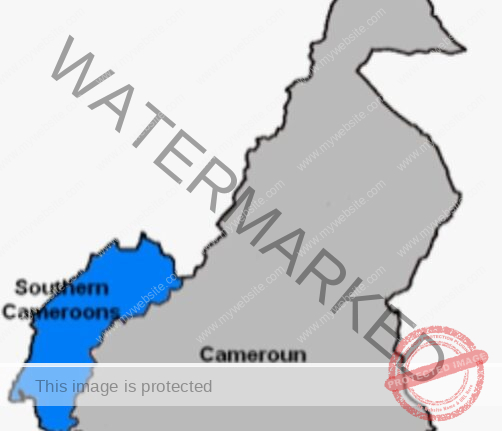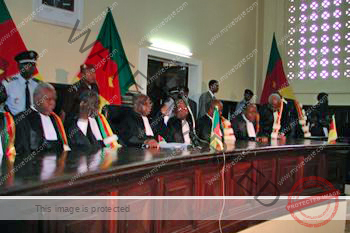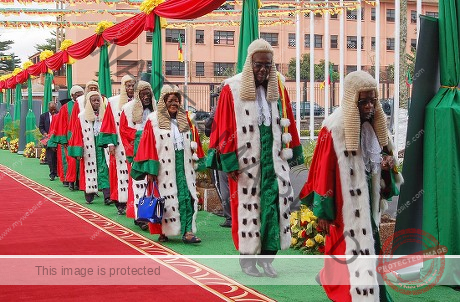By Mankah Rosa Parks | Senior Investigative Correspondent
Yaounde – June 2025: “We are a nation at war.”
So declared veteran journalist Eric Chinje in his widely circulated essay “Understanding the Civil War in Cameroon.” In it, he described the post-1961 betrayal of Anglophones and affirmed, unequivocally, the legitimacy of their uprising against La République du Cameroun. Yet, in a stunning reversal during a recent interview with Chris Anu on Ambazonia Broadcasting Service (ABS), Chinje now declares the fight for independence a “pipe dream.”
What changed? Cameroon hasn’t ended the war. Anglophones are still being killed, displaced, imprisoned, and disenfranchised. The same regime sits in Yaoundé, the same constitution holds sway — unitary, oppressive, colonial in all but name.
So what happened to Eric Chinje?
I. The Weight of His Own Words
Let us begin with Chinje’s own testimony:
“In 1965, the Prime Minister of the State of West Cameroon… was summarily dismissed… and replaced by a person appointed by Yaoundé.”
This was not federalism. This was annexation by stealth. Chinje’s original analysis, grounded in fact, laid bare the beginning of a long trajectory of political disempowerment, economic marginalization, and cultural erasure. He rightly identified the betrayal of the 1961 union, a foundational moment when Southern Cameroons was promised autonomy and instead delivered to dictatorship.
And then this:
“The vast majority of Anglophones in the country wondered, with growing anguish, whether the trajectory of society corresponded to their sense of belonging…”
By this statement, Chinje conceded that the Cameroonian state had failed not just in governance but in nation-building — the most basic test of legitimacy. If the Anglophones felt alienated for five decades, and their elected leaders were systematically neutralized, what recourse did they have?
Dialogue? The Biya regime responded to peaceful protests in 2016 with bullets.
Law? The courts are instruments of the central state.
Politics? Anglophones have been outnumbered and outmaneuvered.
His essay essentially validated what Ambazonians now act upon: that the right to self-determination is not a dream — it is a duty when the social contract is broken.
II. The Sudden U-turn: Coerced or Compromised?
In dismissing Ambazonian independence as a pipe dream, Chinje offers no substantive rebuttal to his earlier claims. He does not explain how the constitutional order has been restored, or how federalism — the original basis of union — has been reestablished.
Could it be that Chinje has bowed to pressure, fear, or financial inducement?
This is not unprecedented. Many Anglophone elites have been co-opted by the Bulu-Beti patronage system, a calculated web of appointments, threats, and bribes used to neutralize dissent. Chinje, once an insider in Cameroon’s state media and later a voice of reform, may now be trapped between his professional past and the haunting reality he once dared to speak.
Or perhaps, as some speculate, Chinje is simply playing the game of “responsible statesmanship” — calling for “unity” not because he believes it possible, but because he fears what Ambazonia’s success would mean for Cameroon, and by extension, for the fragile foundations of many post-colonial African states.
III. From Sacred Heart to Sacrificial Lambs
Eric Chinje is not alone in this tragic arc. He joins a long line of Anglophone elites — Paul Njukang Tasong, Paul Ghogomu Mingo, and others — men who were trained at the very best institutions the British Southern Cameroons ever offered. Graduates of Sacred Heart College, a bastion of academic excellence and moral formation, these men were once held up as beacons of integrity and hope.
Yet today, they serve a regime that destroys their own hometowns, jails their people, and silences dissent. The question must be asked: How does one go from Sacred Heart to serving the dictatorship of Paul Biya?
The answer is painful but necessary: corruption, co-optation, and a systematic manipulation of ambition and fear.
Ambazonians must therefore be vigilant — your enemy may not always wear a uniform. He might be your neighbor, your alumnus, your class prefect from 1982.
The colonial system thrives not only through tanks and laws but through traitors in fine suits, alumni dinners, and carefully crafted lies.
IV. Is Ambazonian Independence a Pipe Dream?
Only if we ignore history:
South Sudan became independent after decades of war and failed peace talks.
Eritrea broke from Ethiopia after a brutal conflict and years of international non-recognition.
Namibia was liberated from South Africa after a global legal battle and internal resistance.
East Timor, Kosovo, and even the United States — all were called “pipe dreams” before they became facts.
Ambazonia has defined territory, a common language, a functioning government in exile, and a people united in suffering and resistance. Under international law, this fits the conditions of remedial secession.
The only dream is believing that a dictatorship like Paul Biya’s — which has murdered children in schools and bombed hospitals — will suddenly become a liberal democracy.
V. Conclusion: Is Chinje a Traitor or a Tragic Figure?
It would be too easy to call Eric Chinje a sellout. He may very well be a victim of the very system he once exposed — silenced, like many before him, by threats, fatigue, or the trauma of watching a homeland burn.
But truth must stand. And the truth is this: Ambazonians are right to resist, and Chinje’s own words — his past clarity — condemn his present confusion.
History has a way of vindicating those who choose justice over comfort. Eric Chinje was once among them. He can be again — but not by calling justice a pipe dream.
Editor’s Note:
This article is intended for educational and public discourse purposes. The views expressed are grounded in verified public statements and published writings.
The Independentist news encourages Mr. Chinje to respond if he so wishes, to continue the debate on the path to peace in Cameroon.





















Leave feedback about this